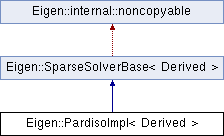Inheritance diagram for Eigen::PardisoImpl< Derived >:

Public Types | |
| enum | { ScalarIsComplex = NumTraits<Scalar>::IsComplex, ColsAtCompileTime = Dynamic, MaxColsAtCompileTime = Dynamic } |
| typedef Traits::MatrixType | MatrixType |
| typedef Traits::Scalar | Scalar |
| typedef Traits::RealScalar | RealScalar |
| typedef Traits::StorageIndex | StorageIndex |
| typedef SparseMatrix< Scalar, RowMajor, StorageIndex > | SparseMatrixType |
| typedef Matrix< Scalar, Dynamic, 1 > | VectorType |
| typedef Matrix< StorageIndex, 1, MatrixType::ColsAtCompileTime > | IntRowVectorType |
| typedef Matrix< StorageIndex, MatrixType::RowsAtCompileTime, 1 > | IntColVectorType |
| typedef Array< StorageIndex, 64, 1, DontAlign > | ParameterType |
Public Member Functions | |
| Index | cols () const |
| Index | rows () const |
| ComputationInfo | info () const |
| Reports whether previous computation was successful. More... | |
| ParameterType & | pardisoParameterArray () |
| Derived & | analyzePattern (const MatrixType &matrix) |
| Performs a symbolic decomposition on the sparcity of matrix. More... | |
| Derived & | factorize (const MatrixType &matrix) |
| Performs a numeric decomposition of matrix. More... | |
| Derived & | compute (const MatrixType &matrix) |
| template<typename Rhs , typename Dest > | |
| void | _solve_impl (const MatrixBase< Rhs > &b, MatrixBase< Dest > &dest) const |
| template<typename BDerived , typename XDerived > | |
| void | _solve_impl (const MatrixBase< BDerived > &b, MatrixBase< XDerived > &x) const |
 Public Member Functions inherited from Eigen::SparseSolverBase< Derived > Public Member Functions inherited from Eigen::SparseSolverBase< Derived > | |
| SparseSolverBase () | |
| Default constructor. | |
| Derived & | derived () |
| const Derived & | derived () const |
| template<typename Rhs > | |
| const Solve< Derived, Rhs > | solve (const MatrixBase< Rhs > &b) const |
| template<typename Rhs > | |
| const Solve< Derived, Rhs > | solve (const SparseMatrixBase< Rhs > &b) const |
| template<typename Rhs , typename Dest > | |
| void | _solve_impl (const SparseMatrixBase< Rhs > &b, SparseMatrixBase< Dest > &dest) const |
Protected Types | |
| typedef SparseSolverBase< Derived > | Base |
| typedef internal::pardiso_traits< Derived > | Traits |
Protected Member Functions | |
| void | pardisoRelease () |
| void | pardisoInit (int type) |
| void | manageErrorCode (Index error) const |
Protected Attributes | |
| SparseMatrixType | m_matrix |
| ComputationInfo | m_info |
| bool | m_analysisIsOk |
| bool | m_factorizationIsOk |
| StorageIndex | m_type |
| StorageIndex | m_msglvl |
| void * | m_pt [64] |
| ParameterType | m_iparm |
| IntColVectorType | m_perm |
| Index | m_size |
 Protected Attributes inherited from Eigen::SparseSolverBase< Derived > Protected Attributes inherited from Eigen::SparseSolverBase< Derived > | |
| bool | m_isInitialized |
Member Function Documentation
§ analyzePattern()
template<class Derived >
| Derived & Eigen::PardisoImpl< Derived >::analyzePattern | ( | const MatrixType & | matrix | ) |
Performs a symbolic decomposition on the sparcity of matrix.
This function is particularly useful when solving for several problems having the same structure.
- See also
- factorize()
§ factorize()
template<class Derived >
| Derived & Eigen::PardisoImpl< Derived >::factorize | ( | const MatrixType & | matrix | ) |
Performs a numeric decomposition of matrix.
The given matrix must has the same sparcity than the matrix on which the symbolic decomposition has been performed.
- See also
- analyzePattern()
§ info()
template<class Derived>
|
inline |
Reports whether previous computation was successful.
- Returns
Successif computation was succesful,NumericalIssueif the matrix appears to be negative.
§ pardisoParameterArray()
template<class Derived>
|
inline |
- Warning
- for advanced usage only.
- Returns
- a reference to the parameter array controlling PARDISO. See the PARDISO manual to know how to use it.
The documentation for this class was generated from the following file:
- third-party-libs/eigen3/Eigen/src/PardisoSupport/PardisoSupport.h
 1.8.12
1.8.12